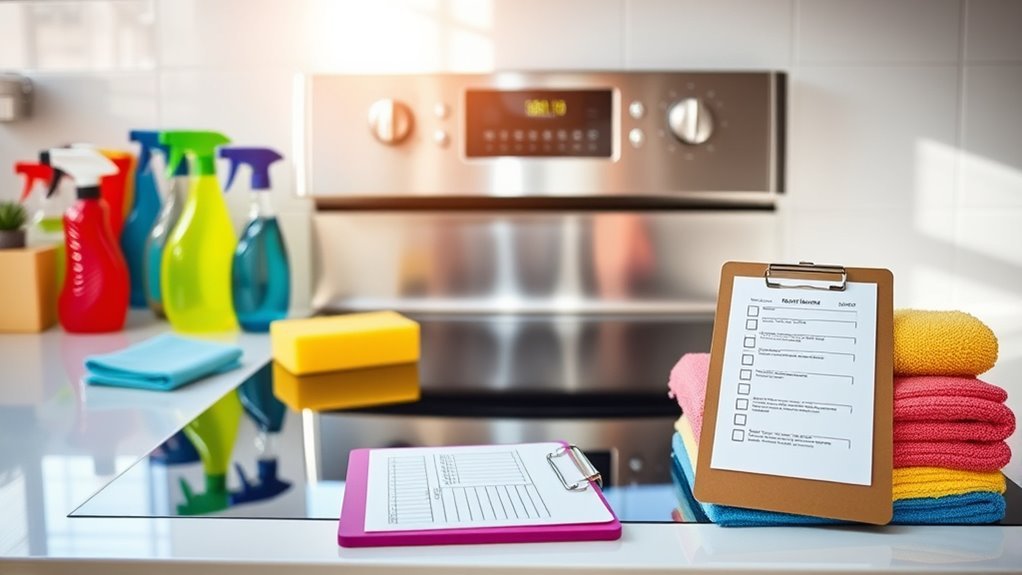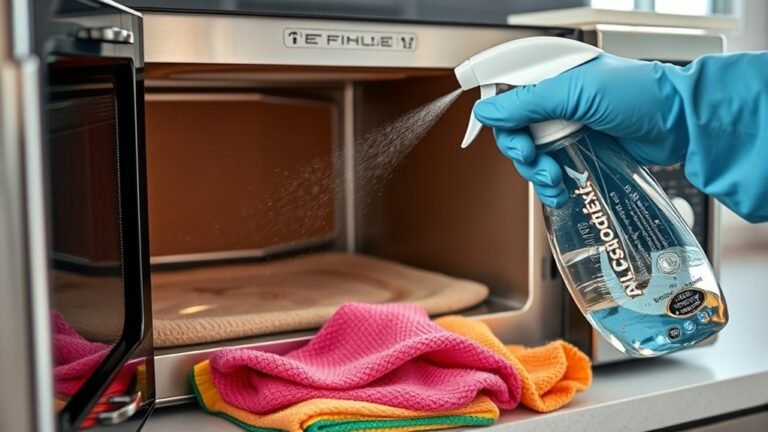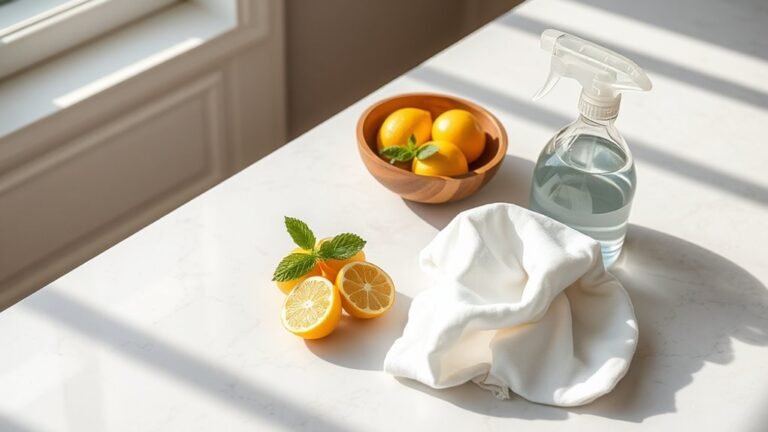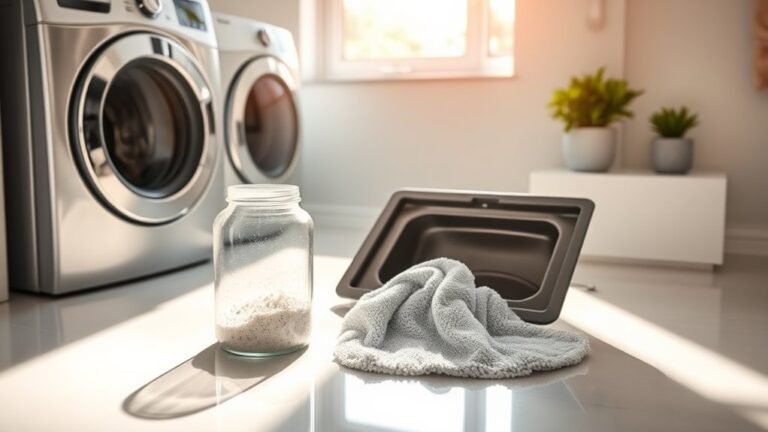Cleaning Checklist for Oven Businesses
You should follow a thorough cleaning checklist to keep your oven business safe and efficient. Clean spills daily, wipe surfaces, and remove crumb trays to prevent residue buildup. Weekly, scrub all parts with non-toxic cleaners and degreasers. Monthly, inspect heating elements, seals, and ventilation filters while maintaining detailed cleaning logs. Use protective gear and safe chemical practices throughout. Proper door and seal care guarantees energy efficiency. Stay on top of ventilation system cleaning for compliance and performance. More tips and schedules will help you streamline your process.
Daily Oven Cleaning Procedures
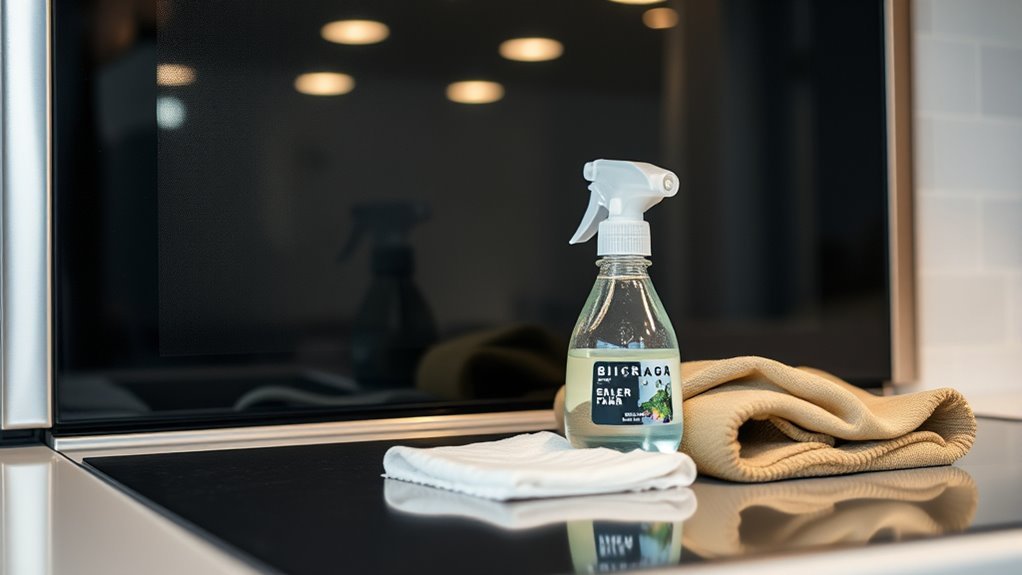
Although it may seem routine, daily oven cleaning is essential to maintain peak performance and prevent buildup that can affect food quality. You need to implement daily sanitization practices that specifically target food residues and grease, ensuring the oven’s interior remains hygienic and odor-free. Follow routine inspection protocols to identify any early signs of wear or malfunction, which can compromise safety and efficiency. Wipe down all accessible surfaces with approved, non-abrasive cleaners, and remove crumb trays or racks for quick cleaning. Maintaining this daily discipline not only preserves your oven’s longevity but also safeguards the integrity of every dish you prepare. By adhering strictly to these procedures, you secure operational freedom and consistent high standards without interruption. It is also important to wipe spills immediately to avoid stubborn stains and reduce grease accumulation in the oven.
Weekly Deep Cleaning Tasks
Each week, you need to tackle built-up grease and grime that daily cleaning can’t fully remove. Focus on scrubbing all surfaces thoroughly to prevent residue buildup that affects performance. While cleaning, inspect oven components closely to catch any signs of wear or damage early. Use non-toxic cleaners to ensure a safe and effective cleaning process.
Grease and Grime Removal
When you tackle grease and grime removal weekly, you prevent buildup that can impair oven performance and pose fire hazards. Start by applying a commercial-grade degreaser, focusing on areas prone to grease accumulation. Scrub thoroughly to break down stubborn residues, then rinse with a damp cloth. Proper grease disposal is vital; never pour grease down drains, as this causes clogs and environmental harm. Instead, collect grease in designated containers for safe disposal. Regular grime prevention practices, like wiping spills immediately and using oven liners, minimize future buildup and save you time. Maintaining this routine not only extends your oven’s lifespan but also guarantees a safer, more efficient kitchen. By committing to these steps, you safeguard your business while enjoying the freedom a clean, well-functioning oven provides.
Inspecting Oven Components
Since your oven endures constant use, inspecting its components weekly is essential to catch wear and tear early. Conduct a thorough oven part inspection, focusing on heating elements, door seals, and control knobs. Look for cracks, corrosion, or any signs of malfunction that could compromise component functionality. Check the thermostat calibration to guarantee accurate temperature control, and verify that the fan blades rotate smoothly without obstruction. Don’t overlook wiring connections; loose or damaged wires can cause safety hazards or operational failures. Document any irregularities and address them promptly to maintain efficiency and safety. Regular oven part inspection not only extends equipment lifespan but also guarantees your business runs without unexpected downtime, giving you the freedom to focus on what truly matters—delivering quality service.
Monthly Maintenance Checks
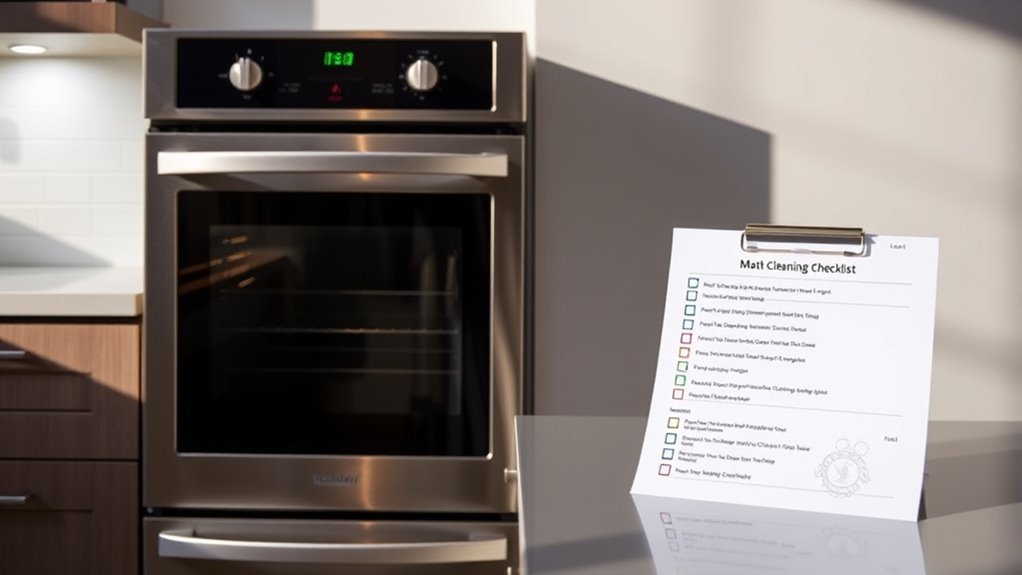
You need to inspect the heating elements monthly to guarantee they’re free of damage and functioning properly. Don’t forget to clean the ventilation filters thoroughly to maintain ideal airflow and prevent overheating. Also, check the door seals for any cracks or wear that could compromise oven efficiency. Establishing consistent care habits helps ensure ongoing equipment reliability and performance.
Inspect Heating Elements
Although heating elements may seem durable, regular inspection is essential to guarantee your oven operates efficiently and safely. Neglecting heating element maintenance can reduce thermal efficiency, leading to uneven cooking and higher energy costs. Each month, visually check for signs of damage, corrosion, or discoloration.
| Inspection Item | What to Look For |
|---|---|
| Element Integrity | Cracks, breaks, or deformation |
| Electrical Connections | Loose wires or burnt connectors |
| Surface Cleanliness | Buildup of grease or residue |
| Heat Distribution | Uneven heating during operation |
| Element Temperature | Excessive heat spots or cold areas |
Address issues immediately to maintain peak performance and prevent costly repairs. Your freedom to run a reliable oven depends on diligent heating element care.
Clean Ventilation Filters
Maintaining heating elements guarantees your oven runs smoothly, but ventilation filters play an equally important role in overall performance. You need to clean the ventilation system filters monthly to prevent grease and debris buildup, which can restrict airflow and increase fire risks. Start by turning off the oven and disconnecting power for safety. Remove the filters carefully and soak them in hot, soapy water. Use a brush to dislodge stubborn residues, then rinse and dry thoroughly before reinstalling. Regular filter replacement is critical—over time, filters lose efficiency and can’t be fully cleaned. Keeping the ventilation system’s filters clean guarantees optimal air circulation, improves oven efficiency, and extends equipment life. Don’t skip this step if you want reliable, safe operation and the freedom to focus on your business.
Check Door Seals
Every month, you should inspect your oven’s door seals for cracks, tears, or signs of wear. Proper door maintenance guarantees heat efficiency and safety, preventing energy loss and uneven cooking. If you spot damage, schedule a seal replacement promptly to maintain performance and avoid costly repairs. Use this checklist to guide your inspection:
| Check Area | What to Look For | Action Required |
|---|---|---|
| Seal Condition | Cracks, gaps, brittleness | Replace if damaged |
| Seal Fit | Proper alignment, tightness | Adjust or replace |
| Door Frame | Warping, damage | Repair as needed |
Stay proactive with door maintenance to keep your ovens running smoothly and your business thriving.
Cleaning Oven Racks and Trays
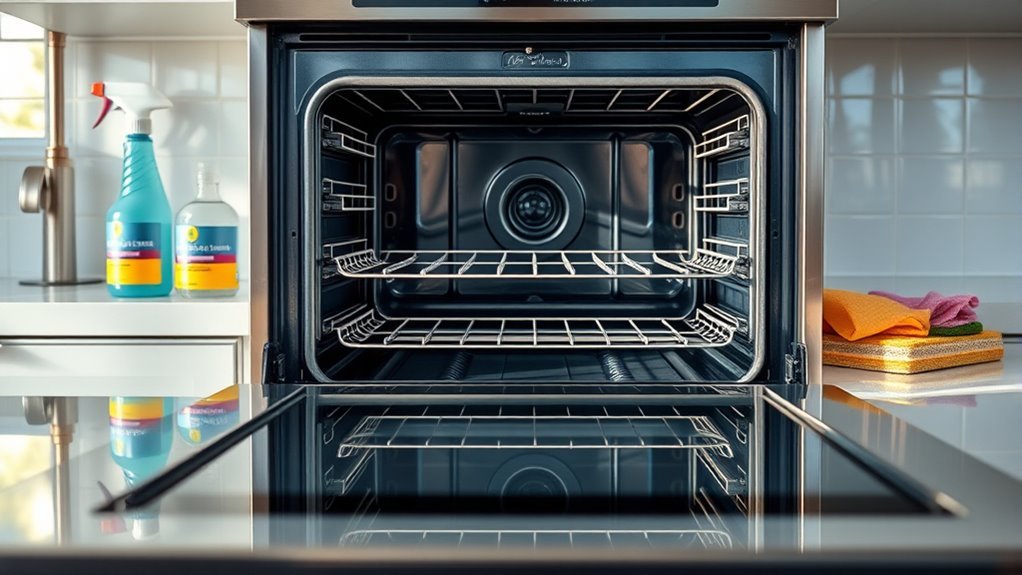
When you clean oven racks and trays regularly, you prevent buildup that can affect both cooking performance and hygiene. Start by removing racks and trays, then soak them in hot, soapy water—this rack soaking softens stubborn grease and grime, making removal easier. After soaking, focus on tray scrubbing using a sturdy brush or non-abrasive pad to eliminate residual debris without damaging surfaces. Rinse thoroughly to remove all loosened particles. Dry completely before returning racks and trays to the oven, guaranteeing no moisture remains that could promote rust or mold. By maintaining this routine, you ascertain your oven components operate efficiently and stay sanitary, giving you the freedom to deliver consistently high-quality cooking results without worry. Using effective soaking solutions such as baking soda or vinegar can further enhance the cleaning process.
Safe Use of Cleaning Chemicals
Although cleaning chemicals are essential for keeping ovens spotless, you need to handle them with care to confirm safety. Prioritize chemical safety by always reading labels and following manufacturer instructions precisely. Wear protective gloves and eyewear to avoid skin and eye irritation. Assure proper ventilation by opening windows or using exhaust fans to prevent inhalation of fumes that could impair your health. Never mix different cleaning agents; combining them can produce toxic gases. Store chemicals securely, away from food and out of reach of children or pets. Always rinse oven surfaces thoroughly after cleaning to remove any chemical residues. By respecting these safety practices, you maintain a clean oven environment without compromising your freedom to work confidently and securely. Using chemical-free products can further reduce health risks and environmental impact while cleaning.
Tips for Maintaining Oven Door and Seals
To keep your oven functioning efficiently, you need to regularly inspect and maintain the door and its seals. Start by checking the oven door for any warping, cracks, or loose hinges that could compromise seal integrity. A misaligned door allows heat to escape, increasing energy consumption and cooking times. Clean the seal gently with a damp cloth and mild detergent to remove grease and debris without damaging its flexible material. Avoid harsh chemicals that can degrade the seal’s effectiveness. After cleaning, verify the seal sits firmly in its groove and isn’t brittle or torn. Replace worn seals promptly to maintain a tight closure. By prioritizing these steps, you’ll preserve your oven’s efficiency, reduce energy waste, and enjoy consistent cooking results—giving you the freedom to focus on your business.
Cleaning Ventilation and Exhaust Systems
Since ventilation and exhaust systems play a critical role in maintaining air quality and safety in your oven business, regular cleaning is essential to prevent grease buildup and blockages. You need to remove accumulated grease and debris from ducts, filters, and fans to preserve ventilation efficiency. This not only improves airflow but also reduces fire hazards, ensuring exhaust safety. Use appropriate degreasers and tools designed for commercial kitchen systems, and schedule thorough cleanings at least quarterly, or more frequently if your ovens run nonstop. Regular inspections will help you spot wear or damage early, avoiding costly repairs and downtime. Keeping these systems spotless lets you operate freely and confidently, maintaining a safe environment for your staff and customers without compromising performance. Be sure to follow manufacturer guidelines to avoid voiding your system’s warranty coverage.
Record-Keeping for Cleaning and Maintenance
Keeping detailed records of all cleaning and maintenance activities is essential for your oven business’s operational efficiency and compliance. Proper record retention guarantees you can track issues, verify schedules, and demonstrate adherence to health regulations. Maintenance logs should be thorough, documenting each cleaning task, date, personnel involved, and any repairs performed. This transparency not only safeguards your equipment but also protects your business legally.
To maintain effective record-keeping, focus on:
- Consistent updates immediately after each cleaning or repair
- Secure storage of logs for easy retrieval
- Regular audits to confirm compliance and identify patterns
- Digital backups to prevent data loss
Incorporating a regular disinfection schedule into your cleaning logs ensures that high-touch surfaces receive appropriate attention to maintain a hygienic environment.
Frequently Asked Questions
How Often Should Commercial Ovens Be Professionally Serviced?
You should stick to a service frequency of at least once or twice a year for commercial ovens to keep them running efficiently. Following a strict maintenance schedule prevents unexpected breakdowns and extends your oven’s lifespan. Depending on your oven’s usage intensity, you might need more frequent servicing. Staying on top of this routine gives you the freedom to focus on your business without worrying about costly repairs or downtime.
What Are the Best Eco-Friendly Oven Cleaning Products?
Did you know that using eco friendly solutions can reduce indoor air pollutants by up to 50%? When choosing the best eco-friendly oven cleaning products, look for those with natural ingredients like baking soda, vinegar, and citrus extracts. These not only cut through grease effectively but also protect your health and the environment. By opting for these natural ingredients, you gain freedom from harsh chemicals while keeping your oven spotless and safe.
Can Oven Cleaning Impact Food Safety Certifications?
Yes, oven cleaning can directly impact your food safety certifications. Certification requirements often demand strict hygiene standards, including clean cooking equipment. If your ovens aren’t properly cleaned, it risks contamination, which can lead to failing inspections or losing certification. Staying diligent with cleaning guarantees you meet those standards, protecting your business and giving you the freedom to operate confidently without compromising food safety compliance.
How to Handle Grease Fires During Oven Cleaning?
When handling grease fires during oven cleaning, prioritize fire prevention by ensuring the oven is cool and free of excess grease before starting. If a fire occurs, avoid water; instead, use a Class K fire extinguisher or smother flames with a metal lid or baking soda. Always have an emergency response plan ready, know your exits, and call emergency services if the fire grows. Staying calm and prepared helps you maintain control and freedom in such situations.
What Training Is Required for Oven Cleaning Staff?
Think of your oven cleaning staff as knights preparing for battle—they need the right armor and weapons. You’ve got to train them thoroughly in safety protocols to protect against hazards like grease fires. They also need to master precise cleaning techniques to guarantee every corner is spotless without damage. This training frees them to work confidently and efficiently, turning a tough job into a manageable, safe routine that keeps your business running smoothly.
